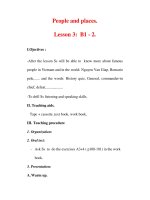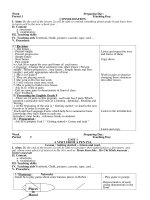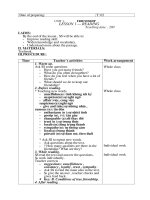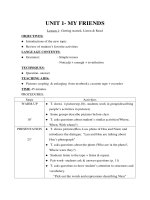- Trang chủ >>
- Y - Dược >>
- Y học gia đình
giaùo aùn baùm saùt anh vaên 8 week 1 period 1 teaching date 2282009 class 81 lesson 1 the simple present tense i objectives ss will be able to use present tense more fluently understand and use so
Bạn đang xem bản rút gọn của tài liệu. Xem và tải ngay bản đầy đủ của tài liệu tại đây (119.79 KB, 14 trang )
<span class='text_page_counter'>(1)</span><div class='page_container' data-page=1>
<b>Week 1</b>
<b>Period:1 </b>
<b>Teaching date: 22/8/2009</b>
<b>Class: 8/1</b>
<b>Lesson 1</b>
<b>The simple present tense</b>
<b>I. Objectives: </b>
- Ss will be able to use present tense more fluently
- Understand and use some model sentences clearly, exactly
<b>II. Language content</b>
- The structure and the usages of the simple present tense
<b>III. Time: 45’</b>
<b>IV. Teaching </b>
<b>A. Form(hình thức)</b>
<i><b>I. Động từ “to be”: am , is, are</b></i>
<b>1. thể khẳng định </b>
<i>I am</i> I am a student
<i>He/ She/ It/ Lan is</i> She is a teacher
<i>We/ You/ They/ Lan and Mai are</i> They are workers
2. Thể phủ định
<i>I am not</i> I am not a student
<i>He/ She/ It/ Lan is not (isn’t)</i> She is not a teacher
<i>We/ You/ They/ Lan and Mai are not(aren’t)</i> They are not workers
3. Thể nghi vấn
Is he/she/ it/ +……….? -> Yes, he/she/it is ; No, he/she/it is not
Are you/ they +………..? -> Yes, I am, we/ they are ; No I am not , we/ they are not
II. động từ thường: go, listen, play, watch……….
1. Theå khẳng định
I, We, You, They, plural noun + Verb (bare-infinitive)
<i><b>He, She, It, single noun + Verb+s/es ( ta thêm es vào sau các động từ tận cùng là: o,s,x,ch,sh)</b></i>
Ex: We go to school every day
She usually watches TV in the evening
2. Thể phủ định
<i><b>I, We, You, They, plural noun + do not (don’t)+ Verb (bare-infinitive)</b></i>
<i><b>He, She, It, single noun + does not (doesn’t)+ Verb (bare-infinitive)</b></i>
Ex: We don’t go to school on Sunday
She doesn’t watch TV in the evening
3. Thể nghi vấn
Do + I, We, You, They, plural noun + Verb (bare-infinitive) + ………?
-> Yes, chủ từ + do / No, chủ từ + don’t
Does + He, She, It, single noun + Verb (bare-infinitive) + ………?
-> Yes, chủ từ + does / No, chủ từ + doesn’t
B. Usage ( cách dùng)
1. Thì hiện tại đơn diễn tả một chân lý, một sự thậ hiển nhiên
Ex: The sun rises in the East
We are students
I live in Thuaän Thaønh village
</div>
<span class='text_page_counter'>(2)</span><div class='page_container' data-page=2>
She ofen goes to school by bike
3. diễn tả hành động sự việc tương lai sẽ xảy ra theo thời gian biểu hoặc chương trình , kế
hoạch đã định theo thời gian biễu
Ex: We have Math on Friday
C. Các trạng từ thường đươc dùng trong thì hiện tại đơn
+ often, usually, frequently : thường
+ always , constantly : luôn luôn
+ someties, occasionally : thỉnh thoảng
+ seldom, rarely : ít khi, hiếm khi
+every day / week / month… : moãi ngày/ tuần/ tháng ….
V. Homework
- learn by heart all the structures
<b>Week 2</b>
<b>Period:2</b>
<b>Teaching date: 29/9/2009</b>
<b>Class: 8/1</b>
<b>Lesson 2</b>
<b>The simple present tense</b>
<b>I. Objectives: </b>
- Ss will be able to use present tense more fluently
</div>
<span class='text_page_counter'>(3)</span><div class='page_container' data-page=3>
<b>II. language content</b>
- The exercises of the simple present tense
<b>III. Time: 45’</b>
<b>IV. Exercises</b>
<b>1. Supply the correct verb form: </b>
a. We seldom (eat) ___________________ before 6.30
b. The sun ( set) ______________________ in the West
c. It (be) __________________ often hot in the summer
d. She always (cook) _________________ in the morning.
e. My father usually (watch) _________________ the news at 7.00
f. What __________ you (do) __________ every morning?
g. She (not drink) _____________coffee. She (drink) ___________ water
h. We (be) ______________ in grade 8 this year
i. Lien’s mother (teach) ___________ Math in our school
j. Nam sometimes (go) ____________ fishing with his friends
<b>2. Turn these sentences into Negative and Question</b>
a. We go to school every weekday
………
………?
b. Lan play badminton every weekends
……….
……….?
c. Hoa likes to read story books
………..
………?
d. Lien and Lan are in the same class
………
……….?
e. Ba’s father works in the factory
………..
………..?
f. Tam studies English every Tuesday
……….
………..?
g. They enjoy watching television
………
……….?
h. His mother cooks dinner for the family
……….
……….?.
i. Hoa’s mother goes shopping every Sunday
………..
……….?.
<b>3. Write complete sentences in Simple Present, using the cues given</b>
a. Lan/ usually/ read/ book/ recess
………..
b. Ba/ seldom/ go / school/ bus
</div>
<span class='text_page_counter'>(4)</span><div class='page_container' data-page=4>
……….
d. Nam / have / short black hair
……….
e. She/ usually/ get up/ early
……….
<b>Week 3</b>
<b>Period:3</b>
<b>Teaching date: 5/9/2009</b>
<b>Class: 8/1</b>
<b>Lesson 3</b>
<b>The simple past tense</b>
<b>I. Objectives: </b>
- Ss will be able to use present tense more fluently
- Understand and use some model sentences clearly, exactly
<b>II. language content</b>
- The structure and the usages of the simple past tense
<b>III. time: 45’</b>
<b>IV. teaching </b>
<b>A. Form(hình thức)</b>
<i><b>I. Động từ “to be”: was/ were</b></i>
<b>1. Thể khẳng định</b>
</div>
<span class='text_page_counter'>(5)</span><div class='page_container' data-page=5>
<i>I, He, She, It, single noun + was not ( wasn’t)</i>
<i>We, You, They, plural noun + were not (weren’t)</i>
<b>3. Thể nghi vấn </b>
Was + he, she, it +………..?
Were + you, they + ………?
-> Yes, chủ từ + was/were . No, chủ từ + wasn’t/ weren’t
II. Động từ thường
1. Thể khẳng định
I, You, He, She,It, We, They, ….+ V2/ V-ed
( nếu động từ có qui tắc : V-ed. Nếu động từ bất qui tắc : cột 2 (V2) )
Ex: We lived in Hue last year
She went to HCM City two days ago
2. Thể phủ ñònh
I, You, He, She,It, We, They, ….+ didn’t + V(bare-infinitive)
Ex: We didn’t live in Hue last year
She didn’t go to HCM City two days ago
3. Thể nghi vấn
Did + Chủ từ + V(bare-infinitive) + ………..?
-> Yes, chủ từ + did / No, chủ từ + didn’t
B. Usages ( cách dùng)
1 . Thì Quá khứ đơn diễn tả hành động đã xảy ra trong quá khứ, chấm dứt rồi và biết rõ thời
gian
Ex: He went to Ha Noi last summer
Mai left this city two years ago
2. Diễn tả hành động đã xảy ra suốt moat khoảng thời gian trong quá khứ , nhưng nay đã hoàn
toàn chấm dứt
Ex: Mozart wrote more than 600 pieces of music
C. Các trạng từ thường dùng trong thì q khứ đơn
Ago : cách đây
Yesterday : hôm qua
</div>
<span class='text_page_counter'>(6)</span><div class='page_container' data-page=6>
<b>Week 4</b>
<b>Period:4</b>
<b>Teaching date:12/9/2009</b>
<b>Class: 8/1</b>
<b>Lesson 4</b>
<b>The simple past tense</b>
<b>Exercises</b>
<b>I. Objectives: </b>
- Ss will be able to use present tense more fluently
- Understand and use some model sentences clearly, exactly
<b>II. Language content</b>
- The exercises of the simple present tense
<b>III. Time: 45’</b>
<b>IV. Exercises</b>
<b>1. Write simple past form of the verbs</b>
a. do- did f. spend -
b. go – g. fly –
c. tell – h. drink
-d. buy – i. swim -
e. give – j. sleep
<b>-2. Supply correct verb form : Simple Past</b>
1. I (see) _____________ her last year
</div>
<span class='text_page_counter'>(7)</span><div class='page_container' data-page=7>
6. Last night, I (go) ________________ to bed late. Suddenly I (hear)___________ a noise. I
(get)_________________ to see what it(be) ____________but I(not see) _____________ anything
<b>3. Complete the dialogues, using the simple past</b>
1. A : How _____________________________?
B : I went to school by bus
2. A: Where did you go last summer?
B: ______________________________ Ha Long Bay
3. A : __________________________ in the supermarket?
B : I bought some beef and oranges.
4. A: What did you drink at the party?
B: __________________________ some Coca-Cola
5. A: __________________________ last night?
</div>
<span class='text_page_counter'>(8)</span><div class='page_container' data-page=8>
<b>Week 5</b>
<b>Period:5</b>
<b>Teaching date: 19/9/2009</b>
<b>Class: 8/1</b>
<b>Lesson 5</b>
<b>Structure : “(not)+ adj + enough + to inf” </b>
<b>I. Objectives: </b>
- Ss will be able to use structure : “(not)+ adj + enough + to inf” more fluently
II. Language content
- The exercises of structure : “(not)+ adj + enough + to inf”
<b>III. Time: 45’</b>
<b>IV. Grammar</b>
(not)+ adj + enough + to inf : không đủ … để làm gì
Ex: The weather is warm enough to go swimming
<b>V. Exercises</b>
<i><b>I./ Combine each of the following pairs of sentences into one sentence, using (not)+ adj + </b></i>
<i><b>enough + to inf</b></i>
1./ Mysister is old. She can drive a car. =>
__________________________________________________________
2./ The radio isn’t. You can put it in your pocket
__________________________________________________________
3./ This coat isn’t warm. I don’t wear it in the winter =>
__________________________________________________________
4./ She is beautiful and intelligent. She can become Miss World
__________________________________________________________
5./ The weather was fine. We could go camping.
__________________________________________________________
6./ The apples aren’t ripe. We can eat them.
__________________________________________________________
7./ Mr. Robinson isn’t rich. He can’t buy a new house
__________________________________________________________
8./ The worker is clever. He can make fine things from wood
__________________________________________________________
<b>II./ Sắp xếp các từ xáo trộn sau thành câu hoàn chỉnh</b>
1./ enough/ Jane/ stay/ to/ alone/ old/ isn’t / at home
__________________________________________________________
2./ enough / to be / is / in my class / Lan /old
__________________________________________________________
3./ strong/ to lift/ enough/ that box/ I/ am
__________________________________________________________
4./ easy / that questions / enough / is / for me / to answer
__________________________________________________________
</div>
<span class='text_page_counter'>(9)</span><div class='page_container' data-page=9>
<b>Period: 6</b>
<b>Teaching date: 26/9/2009</b>
<b>Class: 8/1</b>
<b>Lesson 6</b>
<b>Exercises</b>
<b>I. Objectives: </b>
practice about many types of exercises: give correct verb forms, multiple choice.
<b>II. Exercises</b>
<b>I./ Multiple choice</b>
<b>1./ I ________ a letter from my old friend last week</b>
<b>a./ sent</b> <b>b./ gave</b> <b>c./ received d./ took</b>
<b>2./ He is ________ to ride his bike to school</b>
<b>a./ not enough old b./ enough not old c./ not old enough</b> <b>d./ enough old</b>
<b>3./ Her mother ________ this city two years ago</b>
<b>a./ left</b> <b>b./ leaves</b> <b>c./ is leaving</b> <b>d./ will leave</b>
<b>4./ He enjoys ________ to music while he is studying</b>
<b>a./ to listen b./ listen</b> <b>c./ listening d./ to listening</b>
<b>5./ Bell was born ________ March 3, 1847</b>
<b>a./ at</b> <b>b./ in</b> <b>c./ on</b> <b>d./ during</b>
<b>6./ The children are old enough to look after ________ </b>
<b>a./ themself b./ them</b> <b>c./ their</b> <b>d./ themselves</b>
<b>7./ We ought ________ up early.</b>
<b>a./ get</b> <b>b./ to get</b> <b>c./ getting</b> <b>d./ got</b>
<b>8./ You should paint the house ________ </b>
<b>a./ your</b> <b>b./ yourself c./ myself</b> <b>d./ herself</b>
<b>II./ Give correct verb form</b>
<b>1./ The sun ( rise) ________ in the East</b>
<b>2./ It (be) ________ often hot in the summer</b>
<b>3./ Most rivers ________ (flow) into the sea.</b>
<b>4./Bees (make) ________ honey</b>
<b>5./ I (go) ________ to DaLat 5 years ago</b>
<b>6./ Tomorrow, she (hold) ________ a party</b>
<b>7./ They (travel) ________ to Nha Trang last month</b>
<b>8./ Nga and Hoa (see) ________ a movie tonight</b>
<b>9./ Sue can ( speak) _________ Chinese very well</b>
<b>10./ What _________ you _________ (do) next summer holiday</b>
<b>Week 7</b>
<b>Period 7</b>
<b>Teaching date:2/10/2009</b>
<b>Class: 8/6</b>
<b>Unit4 : OUR PAST</b>
<b>I. Objectives: </b>
</div>
<span class='text_page_counter'>(10)</span><div class='page_container' data-page=10>
<b>The structure ”used to” , prepositions of time </b>
<b>III. Time: 45’</b>
<b>IV. Teaching </b>
<b>A. Grammar</b>
I. "used to" diƠn t¶ thãi quen hay 1 việc th ờng làm trong quá khứ không liên quan ở hiện tại nữa
<b>Ex: He used to smoke 20 cigarettes a day</b>
<b>* S + used to + infinitive</b>
<b>Ex: I used to play video game but now I don't</b>
<b>II. Prepositions of time: AT/ IN/ON</b>
1 AT :chØ thêi gian vµo lóc mÊy giê
<b>Ex: at 5 am , At 6 o’clock</b>
<b>* At noon</b> <b>: nưa tra,gi÷a tra</b>
<b>* At night</b> <b>: nửa đêm</b>
<b>At sunrise/ dawn</b> <b>: lúc bình minh</b>
<b>At sunset/ </b> <b>: lúc hoàng hôn</b>
<b>At breakfast/ lunch/ dinner: bữa sáng - tra - tối</b>
2. On:
<b>+ 1 ngày trong tuần</b>
<b>+ 1 buổi trong ngày</b>
<b>+ Ngày - tháng - năm</b>
<b>Ex: On Sunday</b> <b>: ngày Chủ nhËt</b>
<b>On the Sunday morning</b> <b>: s¸ng Chđ nhËt</b>
<b>On February 8th <sub>2000</sub></b> <b><sub>: mùng 8/2/2000</sub></b>
3. In (tháng/ năm)
<b>Ex: In May</b>
<b>In 1989</b>
<b>* In the morning/ afternoon: bi s¸ng/ chiỊu</b>
I. Em hÃy điền vào ô trống bằng những từ thích hợp cho s½n: in, on, at
<b>1. I’ll see you ____________ Sunday, April 1</b>
<b>2. We’ll arrive ________ 5 o’clock _________15 September</b>
<b>3. It often rain ___________ May</b>
<b>4. What do you usually do _____________ the weekend?</b>
<b>5. They often go out for dinner ____________ Sunday evening</b>
<b>6. They got married ____________ December 1996</b>
<b>7. I saw him _____________ 1998</b>
<b>8. Do you often give each others presents ____________ Christmas Day?</b>
<b>Week 8</b>
<b>Period </b>
<b>Teaching date:9/10/2009</b>
<b>Class: 8/6</b>
<b>Unit4 : OUR PAST</b>
<b>I./ Objectives</b>
<b>Review the structure”used to”, preposition of time , some irregular verbs</b>
<b>II. Language content</b>
<b>Used to +bare infinitive, preposition of time, irregular verbs</b>
<b>III. Time: 45’</b>
<b>IV. Teaching </b>
</div>
<span class='text_page_counter'>(11)</span><div class='page_container' data-page=11>
<b>Light- lit-lit- đốt</b> <b> </b> <b>eat-ate-eaten: ăn</b>
<b>Hold- held-held: cầm nắm giữ </b> <b>fly-flew-flown: bay</b>
<b>Choose- chose-chosen: chn</b> <b>take-took-taken: lõy</b>
<b>Run-ran-run: chạy </b> <b>do-did-done: làm </b>
<b>Lose-lost-lost: đánh mất</b> <b>come-came-come:</b>
<b>Find-found-found: t×m thÊy </b> <b>see-saw-seen: nh×n xem</b>
<b>Fall-fell-fallen: rời ngÃ</b> <b>read-read-read: c</b>
<b>Sit-sat-sat: ngồi</b>
II. Điền vào chỗ trống những giíi tõ thÝch hỵp:
<b>1. I was born ……... January 1st<sub> 1965</sub></b>
<b>2. When did you meet him? At ………. lunch to day.</b>
<b>3. It often rains ………... October in Viet Nam.</b>
<b>4. What are you going to do ……….. 2009?.</b>
<b>5. I don’t know but I’m going to go to college ….... September this year.</b>
<b>6. Do you want to watch the sky …………. Sunset?</b>
<b>7. Sure and I’d like to walk ……… sunrise, too.</b>
<b>8. Well, let’s go for a walk ………... the weekends.</b>
<b>9. I don’t know what he’s doing ………….. this moment .</b>
<b>10. What did he do ……….. thi ninth of April, 2000? </b>
III. Used to didnt use to Đt câu với các từ trên nói cuộc sống con ng ời cách đây 200 năm.
<b>Ex: -travel/ donkey (con la)</b>
<b>-> People used to travel on donkey 200 years ago.</b>
<b> - not talk/ on the phone</b>
<b>-> People didn’t use to talk on the phone 200 years ago.</b>
<b>1. believe in/ fairytales (chun thÇn tiªn)</b>
<b>-> People used to believe in fairytales 200 years ago.</b>
<b>2. think/ the earth was flat</b>
<b>-> People used to think the earth was flat 200 years ago.</b>
<b>3. not go to work/ by car</b>
<b>-> People didn’t use to go to work by car 200 years ago</b>
<b>Week 9</b>
<b>Period: 9</b> <b> </b>
Topic: STUDY HABIT
<b>Date: 16.10.09</b>
ABVERDS OF MANNER
<b>1/ Objectives: By the end of the lesson students will be able to use the adverbs of manner.</b>
<b>2/ Language contents: </b>
<b>3/ Techniques: pair work, ask and answer, substitution</b>
<b>4/ Teaching aids: extra board </b>
<b>5/ procedures: </b>
STAGES CONTENTS NOTES
* Warm up: <i>* Matching adverbs with adjectives</i>
<b>fast quick bad quickly good</b>
<b>beautifully badly fast well</b>
<b>excellent slowly excellently show</b>
<b>Ss: match and remind how</b>
<b>to form an adverb of</b>
<b>manner. </b>
<b>T: marks and leads in the</b>
<b>new lesson.</b>
<i>1/ Activity 1: I/ Correct mistakes in these sentences:</i>
</div>
<span class='text_page_counter'>(12)</span><div class='page_container' data-page=12>
<b>2. He walks slow.</b>
<b>3. I have quickly breakfast.</b>
<b>4. What do you do to remember words betterly?</b>
<b>5. There are many differently ways of learning</b>
<b>words.</b>
<b>6. I don't know very well him.</b>
<b>7. I do it very good.</b>
<b>8. He runs fastly.</b>
<i><b>* Notes: S + be + adj + Noun </b></i>
<b> S + V + adv</b>
<b> - Adj modifies a Noun or a subject</b>
<b> - Adv modifies a verb </b>
*Answer keys:
<b>1. He speaks English well. </b>
<b>2. slow slowly</b>
<b>3. quickly quick</b>
<b>4. betterly better</b>
<b>5. differently different </b>
<b>6. I don't know him very well.</b>
<b>7. good well</b>
<b>8. fastly fast (adv)</b>
<b>T: reminds the uses of</b>
<b>adverbs and adjectives in</b>
<b>sentences. </b>
<b>Ss: notice.</b>
<i>2/ Activity 2: II/ Rewrite sentences.</i>
<b>Ex: He runs slowly. </b>
<b> He is a slow runner. </b>
<b>1. He eats quickly.</b>
<b>2. He is a good singer. </b>
<b>3. She teachers English excellently. </b>
<b>4. They work very hard.</b>
<b>5. She performs badly.</b>
<b>6. We are quick learners.</b>
<b>7. You are a good listener. </b>
<b>T: tells the request and</b>
<b>guides.</b>
<b>Ss: work in pairs.</b>
<b>T corrects.</b>
*Answer keys:
<b> 1. He is quick eater </b>
<b>2. He sings well</b>
<b>3. She is an excellent</b>
<b>teacher</b>
<b>4. They are hard workers </b>
<b>5. She is a bad performer </b>
<b>6. We learn quickly </b>
<b>7. You listen very well. </b>
<b>*Homework: Read all ones again.</b>
<b> Write 2 sentences with adj/adv talking about</b>
<b>your study </b>
<b>Ex: He is a good student. He studies well.</b>
</div>
<span class='text_page_counter'>(13)</span><div class='page_container' data-page=13>
<b>Week 10 ,</b> <b>Period:10</b>
<b>Teaching date: 24/10/2009,</b> <b>Class: 8/1</b>
<b>Unit 5</b>
<b>I. Objectives: </b>
- Ss will be able to use commands, requests and advice in reported speech (Câu mệnh lệnh, u cầu
và lời khun ở lời nói gían tiếp.)
<b>II. Language content</b>
- The structure and the usages of commands, requests and advice in reported speech
<b>III. Time: 45’</b>
<b>IV. Teaching </b>
<b>A./Grammar</b>
<b>I. Commands, requests in reported speech (Câu mệnh lệnh ở lời nói gián tiếp)</b>
<b>Lời nói gián tiếp là lời nói của 1 người được thuật lại theo từ riêng của người thuật lại nhưng ý</b>
<b>nghĩa không đổi.</b>
<b>Khi thuật lại 1 mệnh lệnh, yêu cầu của ai , chúng ta thường dùng động từ tường thuật: tell (bảo),</b>
<b>oder, command ( ra lệnh), warn ( cảnh báo),…</b>
<i><b>1./ Affirmative commands, requests (Meänh leänh, yêu cầu xác định)</b></i>
</div>
<span class='text_page_counter'>(14)</span><div class='page_container' data-page=14>
<b>=> Tim told his younger brother to clean the bike</b>
<i><b>2./ Negative commands, requests ( Mệnh lệnh, yêu cầu phủ định)</b></i>
<b>S + asked/ told/warned + O + not to infinitive</b>
<b>e.g: “Don’t play with matches,” the mother said.</b>
<b>=>The mother warned her child not to play with matches</b>
<b>II./ Advice in reported speech ( Lời khuyên ở lời nói gián tiếp)</b>
<b>Động từ tường thuật : Advise( khuyên), recommend (khuyên),…</b>
<b>Cấu trúc:</b>
<b>- S + should/ ought to + V + O</b>
<b>S + said + O + should + bare infinitive</b>
<b>e.g: The teacher said to Nam“ You should work harder on your Math”</b>
<b>=> The teacher said Nam should work harder on his Math</b>
<b>B./ Exercise :</b>
<b>I./ Put the following commands and requests in to reported speech (VI, P.38)</b>
<b>e.g: The teacher said to Tim, “Com into my office, please” </b>
<b>=> The teacher asked/ told Tim to come into her office</b>
<b>1./ Their mother said to them,” Don’t make so much noise”</b>
<b>2./ The police policeman said, “ Show me your driving license, please”</b>
<b>3./ The lifeguard said, “Don’t swim out too far, boys”</b>
<b>II./ Report the doctor’s advice to Mr. Robinson (VII, P.38)</b>
<b>1./ “You should take a few days off” => the doctor said he should take a few days off.</b>
<b>2./ “ You should stay in beds for a few days”</b>
</div>
<!--links-->









